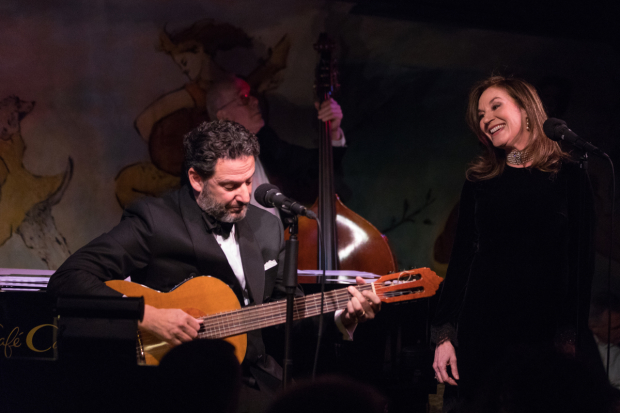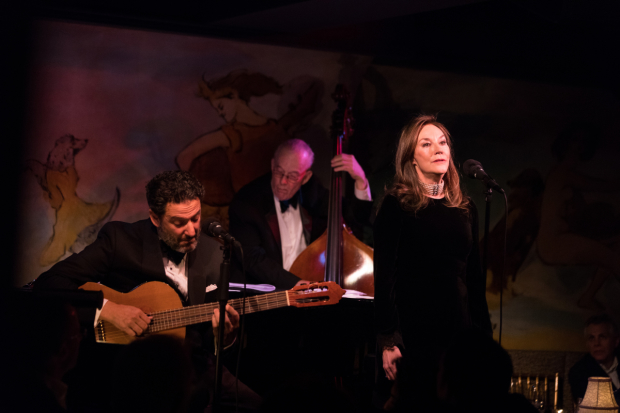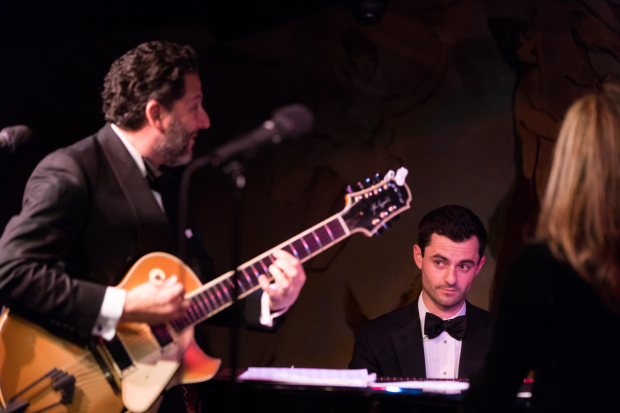John Pizzarelli & Jessica Molaskey: The Arc of a Love Affair

(© David Andrako)
"I come to sing a song about hope," Jessica Molaskey sweetly incants in the opening moments of her new show at Café Carlyle with husband John Pizzarelli. It's a lyric from Jason Robert Brown's "Hope," a number the Broadway composer just penned this month, on November 9. The song speaks of an almost unreasonable hope breaking through a mountain of disappointment: "Though I can't guarantee there's something real behind it, / I have to try to show my daughters I can find it," Molaskey sings. It's exactly the right note for this moment as we cautiously search for hope and joy wherever it can be found. From that point in the show, we are present and ready for whatever Pizzarelli and Molaskey bring to the stage.
Titled The Arc of a Love Affair, this show marks Pizzarelli and Molaskey's 10th November residency at Café Carlyle, and like a fine wine, their act only gets better with age. While neither is a great comedian or has an outsize personality, both are stellar musicians. Wisely, they put their best foot forward at the top of the show, blitzing us with four fantastic numbers in rapid succession: After "Hope" comes a breezy rendition of "You Could Drive a Person Crazy" from Stephen Sondheim's Company. That number fades into Joni Mitchell's "Help Me," which Molaskey endows with all the giddy excitement of a dangerous new love. Pizzarelli takes over with some minor-key mischief on Dave Frishberg's "Slappin' the Cakes on Me," a naughty jazz number hinged on a somewhat incomprehensible idiom.

(© David Andrako)
An accomplished stage actress, Molaskey is particularly deft in her interpretation of the songs of Joni Mitchell. She seems to imbibe the whole room as she draws out the vowels in the lyric "I could drink a case of you." We can visualize her drawing that map of Canada on the back of a cartoon coaster.
As usual, Pizzarelli plays the guitar throughout, wowing us with an energetic instrumental arrangement of "Brotherhood of Man" from Frank Loesser's How to Succeed in Business Without Really Trying. He scats as he plays, tossing the spotlight over to bassist Jay Leonhart, who dexterously glides across the fingerboard. Meanwhile, pianist Konrad Paszkudzki approaches the ivories with a gentle but confident attack. Every note is deliberate and clear on his improvised solos, so that nothing feels fudged or half-considered. This is even more impressive considering his relative youth: Pizzarelli points out that his pianist is a good 50 years younger than his bassist, making this band an impressive multigenerational collaboration.
Like in previous shows, Pizzarelli and Molaskey present unexpected arrangements of well-known standards that crack open something fundamental about the song. Pizzarelli's mellow rendition (he calls it a "James Taylorization") of "You've Got to Be Carefully Taught" from South Pacific is the first time I've heard the song not come off as preachy or self-righteous. Pizzarelli's matter-of-fact, almost demure delivery conveys multiple emotions: muted anger, disappointment, and hope for a kinder tomorrow beyond this seemingly irredeemable today. The couple proves the durability of the Rodgers and Hammerstein catalogue with a bossa nova setting of "I Have Dreamed" from The King and I — undeniably powerful in its restrained elegance. For Pizzarelli and Molaskey, less is consistently more.

(© David Andrako)
The night would be incomplete without a tribute to the late Leonard Cohen (who died on November 7), and the Pizzarelli-Molaskeys deliver one that feels like a wallop upside the head. Molaskey incants Cohen's prescient lyrics to "Everybody Knows" with menacing clarity, like Cassandra predicting the fall of Troy:
Everybody knows that the dice are loaded
Everybody rolls with their fingers crossed
Everybody knows that the war is over
Everybody knows the good guys lost
Everybody knows the fight was fixed
The poor stay poor, the rich get rich
That's how it goes
Everybody knows.
This bitter pessimism feel like a far cry from the grasping optimism of the Brown number at the beginning of the show, but Pizzarelli and Molaskey are experienced enough to know that the arc of a good cabaret act (like the arc of a good love affair) doesn't bend in a smooth curve. Rather, its vitality stems from its unpredictability. Our souls may ache from the experience, but we cannot turn away.











